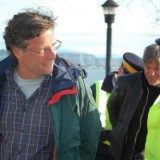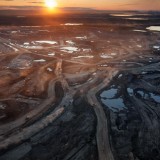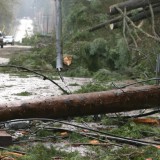Spring comes, the earth warms, and the multi-foliate greens of fresh buds emerge from branches, stems and soil. People venture freely from the confines of their dwellings and shelters, shed unnecessary clothes, and embrace the outdoors with an optimism and trust that should be remembered throughout the rainy and cold seasons. In this time of opening and promise, as our planet tips itself to the welcoming warmth of the sun, we come closest to realizing our intimate bond with nature.
This memory lives in the spring rituals of tilling and planting, of celebrating and feasting, of travelling and adventuring. May Day, hidden beneath another misnomer called Queen Victoria’s birthday, is actually the modern incarnation of an ancient festival of rebirth and renewal, the traditional honouring of the fertility and revival that occurs every spring. People gather together in open places to parade, make music, dance and — in some remnant places — to dance around the Maypole.
Anthropologists note the symbolic significance of this event. The phallic pole is decorated with coloured ribbons as young children — pubescent girls in ancient history because they are the most vivid symbols of regeneration — skip and wind the ribbons in complex patterns around this erect pole. The intricate lacing and unlacing of the dance represents the biological urge of life inventing, spending and then repeatedly reinventing itself as the male and female energies of egg and sperm, of stigma and stamen, of flower and pollen, replicate themselves to perpetuate life. It’s a time of hope and a definition of our essential selves as participants in the endless rhythms of nature.
We, of course, are intimate partners in the living fabric of the most unique place in the universe. This is a role we have played relatively well for most of our history as a species, the proof of which is simply our survival, adaptation and refinement for more than a million years. Indeed, we have played this role remarkably well. Seven billion of us now occupy the planet, imposing ourselves in every possible piece of its geography, wielding such influence that we are now altering geographies, ecologies and even weather and climate. The effect of our success is currently so great that we are naming this epoch in Earth’s history after ourselves — the Anthropocene, a term that reflects both our power and our responsibility.
As children dance around the Maypole, enacting a primeval ritual and reaffirming our bond to nature and its imperatives, we photograph them with digital cameras, amplify the music with the magic of electricity, and dress in miracle fabrics made by the alchemy of technology. When we choose to travel, we can fly faster, higher and farther than birds, or we can speed along highways more swiftly than cheetahs. Within the confines of dwellings, our ingenuity can turn night into day and winter into summer. The foods of our feasts commonly come from distant corners of the world, brought by vessels that seem to defy the limitations of distance and time.
And yet, the common grass, so fresh and green beneath the feet of the dancing children, is essential to our sense of belonging and meaning. So, too, are the surrounding trees, the nearby ocean, the flowing river, the billowing clouds, the blue sky, the company of distant mountains and the companionship of animals, birds and insects — all are crucial ingredients in the richness we call the marvel of life.
Would our sanity survive if these natural things did not accompany us on our journey from the light of birth to the darkness of death? Could we live fully and contentedly within the mechanical shapes of cities, only wandering within the squares and angles of our buildings, always walking on the hard streets of asphalt and concrete? Just as an imprisoned animal confined to a cage, we would suffocate little-by-little even though we continued to breathe. We should not be surprised, therefore, to discover that we learn better, heal faster and relax more in the company of nature. Or that we protect ourselves from our own destructive inclinations by preserving nature in gardens, greenbelts and parks.
So something sacred pulses in the bodies of the dancing children as their ribbons wind and unwind around the Maypole, as their feet so playfully touch, leave and then return to the living soil. This is the contact that always was and always must be if we are to retain our sanity and our civilizations. We cannot escape the home of our origin and our destiny. The dancing, the parade, the music, the spring festivities — whatever they may be — all affirm that the familiar and unfamiliar members of the community are gathered together as more than neighbours, as more than citizens, as more than shoppers and consumers in the cold machinery of commerce.
The Maypole is an earthy and hopeful reminder that we belong to a more lasting and profound heritage than our tragic wars and our tangled squabbling over economics, finance, philosophy and religion. We all share the same fragile planet, each of us participating in the intricate steps of its timeless and sacred dance.










